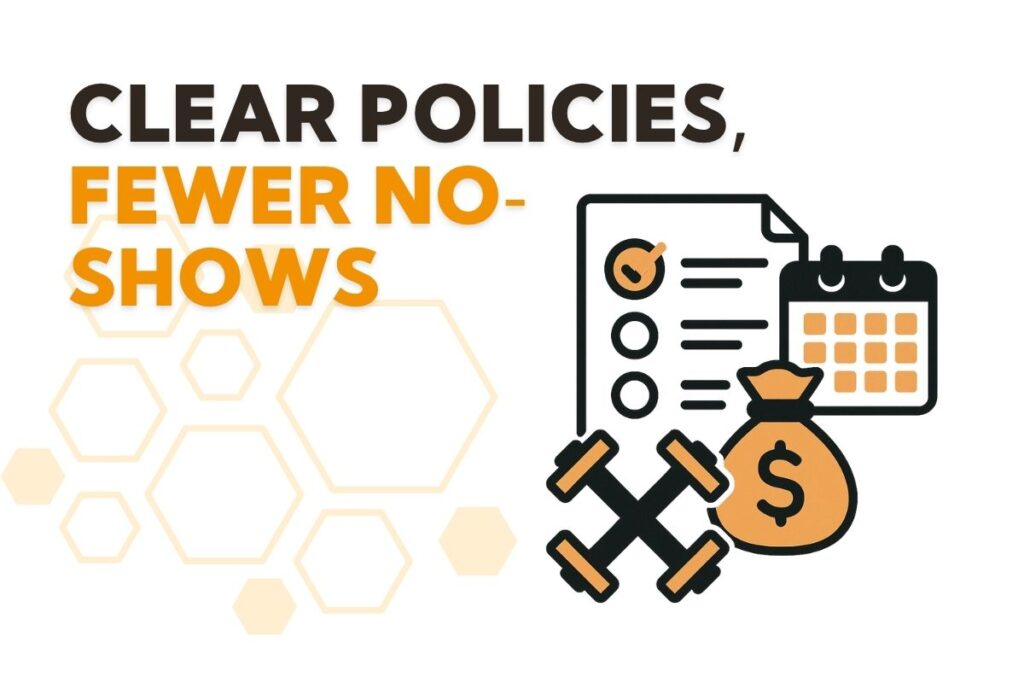Cancellations and rescheduling policy template—having one in place is essential for massage clinics aiming to protect revenue, reduce no-shows, and deliver a consistent experience for clients and staff. A single missed session can disrupt the day’s flow, impact earnings, and frustrate therapists. Without a well-defined policy, clinics risk unpredictable schedules, stressed teams, and a breakdown in client accountability.
This guide will help you create a fair, enforceable, and client-friendly policy that supports your operations and strengthens your professional boundaries. You’ll find a sample policy, key elements to include, and practical tips for communicating and enforcing it effectively.
Why Your Clinic Needs a Clear Cancellation Policy
Safeguard Your Schedule and Revenue
Every missed appointment is a lost opportunity—both financially and relationally. Without a cancellations and rescheduling policy template, clients may believe short-notice changes are harmless. But therapists lose income, the clinic loses time, and the day’s balance is disrupted. A clear policy reinforces that your time is valuable and helps prevent repeat occurrences.
Reinforce Professionalism and Trust
Clients appreciate structure. A published cancellations and rescheduling policy template fosters mutual respect, avoids confusion, and promotes confidence in your clinic’s reliability. When expectations are laid out in advance, clients are less likely to push boundaries or feel surprised when fees are applied.
Key Components of a Strong Policy
Define Your Notice Period
Standard notice periods range from 24 to 48 hours. Choose a window that gives your team time to adjust schedules and possibly rebook the slot. Clearly outline this timeframe in your cancellations and rescheduling policy template.
Set Fair and Transparent Fees
Consequences encourage accountability. Options include:
- Charging 50% of the session rate for late cancellations
- Charging 100% for no-shows
- Applying a flat fee for cancellations under the notice window
Clearly stating these consequences in your cancellations and rescheduling policy template reduces negotiation and supports fairness.
Clarify Communication Channels
Clients need to know how to reach you. Acceptable methods might include:
- Calling the clinic
- Texting your automated system
- Canceling via your booking platform
Avoid relying on social media messages or informal contacts, which are easily overlooked.
Allow Room for Compassion
Life happens. Your policy can include reasonable flexibility for emergencies or illness—but it should be the exception, not the rule. Define how exceptions will be handled and how clients should communicate them.

Building Your Policy Step by Step
Step 1: Review Your Existing Data
Assess patterns. Are no-shows common on certain days or among specific client groups? These insights can help shape your cancellations and rescheduling policy template for better results.
Step 2: Use Clear, Supportive Language
Balance professionalism with empathy. For example:
“We require 24 hours’ notice for any cancellation or rescheduling. Late changes will result in a fee to help us maintain availability for all clients.”
Step 3: Align Your Team
Front desk staff and therapists must understand and consistently apply your policy. Include your team in the drafting process to get their input and ensure they’re confident in explaining it.
Step 4: Display the Policy Everywhere
Embed your cancellations and rescheduling policy template in all client touchpoints:
- Your website’s booking page
- Appointment confirmation emails
- Reminder messages
- Intake forms and consent paperwork
- In-clinic signage
Tools like Hivemanager can automate reminders and streamline policy acknowledgments, helping your team stay on track.
Bringing the Policy to Life
A Real Example in Action
A massage clinic in Edmonton noticed repeated Friday afternoon no-shows. After integrating a 24-hour notice policy with a 50% fee, no-show rates dropped by 60%. The clinic included reminders in confirmation emails and automated texts, removing friction from enforcement.
Enforce It Consistently
Your cancellations and rescheduling policy template only works when it’s enforced. Inconsistent application undermines its purpose. Equip your staff with the confidence to refer to the written policy without hesitation.
Sample Staff Response
“Thanks for reaching out. Because this change is within 24 hours of your appointment, we’ll need to apply the $50 cancellation fee. It helps us keep our schedule fair for all clients.”
Technology Makes Enforcement Easier
Set Up Timely Reminders
Automated emails and texts help prevent forgetfulness while reinforcing your policy. Schedule them for 48 and 24 hours before each appointment.
Secure Payment Info at Booking
Require credit card details to confirm bookings. This simplifies fee collection and reduces awkward conversations. Hivemanager’s secure scheduling platform supports card-on-file features and ensures compliance.
Monitor Repeat Offenses
Track client attendance history through your system. If a client has frequent short-notice changes, you can flag their account and adjust their booking privileges.

Refine and Adapt Your Policy
Ask for Feedback
After implementing your cancellations and rescheduling policy template, check in with your team and clients regularly. Are there common misunderstandings? What could be improved?
Revisit the Policy Quarterly
As your clinic evolves, your policy should reflect those changes. Reevaluate your cancellation window, fee structure, or language as needed.
Stay Legally Compliant
Make sure your policy adheres to local laws regarding service agreements, fee transparency, and client communication. Keep documented acknowledgments for added protection.
Clear Boundaries, Stronger Relationships
Setting a cancellations and rescheduling policy template isn’t about being inflexible—it’s about creating a predictable, respectful environment where clients and therapists thrive. When you clearly communicate expectations, enforce them with empathy, and use technology to support your efforts, your clinic becomes more resilient and your time more respected.
If you’re ready to protect your schedule and build better client relationships, start with the steps in this guide. Your future self—and your team—will thank you.
Frequently Asked Questions
Most clinics use a 24- or 48-hour window. It depends on how quickly you can refill a spot. For solo practitioners, 24 hours is often ideal. For larger clinics with waitlists, 48 hours may offer more protection.
Charging 100% of the session cost for no-shows is becoming more common. It sets a clear boundary, but you can also offer a first-time grace exception if needed. Just make sure your cancellations and rescheduling policy template is clearly stated up front.
That’s why it’s essential to communicate the cancellations and rescheduling policy template early and often—on your website, during booking, and in reminder emails. Document client acknowledgments to avoid future disputes.
Yes. You can build flexibility into your cancellations and rescheduling policy template by allowing one emergency cancellation per year, offering same-day rescheduling when possible, or waiving fees for long-term loyal clients. But always document these exceptions.



